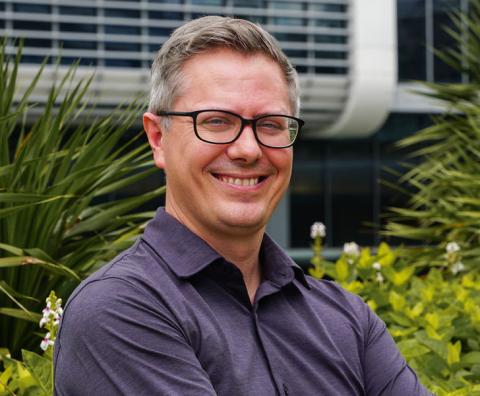Daniel Friess
Cochran Family Professor

Education & Affiliations
Areas of Expertise
Biography
Dr. Daniel Friess is the Cochran Family Professor of Earth and Environmental Sciences at Tulane University and currently serves as Director of the Murphy Institute’s Center for Public Policy Research (CPPR). Appointed in July 2025, he leads CPPR in advancing innovative solutions to pressing 21st-century policy challenges.
Dr. Friess is an internationally recognized multidisciplinary climate scientist whose work bridges ecology, policy, and community resilience. He serves as Co-Editor-in-Chief of WIREs Climate Change and contributes to global initiatives such as the Blue Carbon Initiative Scientific Working Group, the IUCN Mangrove Specialist Group, and the Global Mangrove Alliance. His leadership and collaborations span academia, government, NGOs, and the private sector.
Before joining Tulane, Dr. Friess spent over a decade at the National University of Singapore (2009–2022). He earned his Ph.D. from the University of Cambridge (2009) and B.Sc. (Hons) from Imperial College London (2004).
For more information, visit The Mangrove Lab.
Courses
EENS3660 Nature-based Solutions
EENS1300 Earth as a Living Planet
Research
Dr. Friess’s research focuses on blue carbon ecosystems, particularly mangroves and coastal wetlands, and their role in climate mitigation. His group investigates:
- Carbon cycling and ecosystem services in coastal wetlands.
- Responses of blue carbon ecosystems to climate stressors, including sea-level rise.
- Impacts of deforestation on carbon dynamics.
- Strategies for conservation and restoration, leveraging carbon markets and national greenhouse gas inventories.
The Mangrove Lab, led by Dr. Daniel Friess, conducts interdisciplinary research on the ecological and climate benefits of coastal wetlands—especially mangrove forests. We examine the threats posed by land-use change and climate change, and explore strategies to incentivize conservation. Our work emphasizes blue carbon and the role of mangroves in climate mitigation, partnering globally with nonprofits, governments, and the private sector to deliver applied solutions.
Research Areas:
Mangroves • Coastal Wetlands • Blue Carbon • Carbon Credits • Ecosystem Restoration
Contributions
Selected Publications
For a full list visit www.themangrovelab.com/publications
Zhang, Luo, Friess, Li. 2025. Global mangrove growth variability driven by climatic oscillation-induced sea-level fluctuations. Nature Geoscience 18, 488-494.
Krause, Cameron, Arias-Ortiz, Cifuentes Jara, Crooks, Dahl, Friess, Kennedy, Lim, Lovelock, Marbà, McGlathery, Oreska, Pidgeon, Serrano, Vanderklift, Wong, Yaakub, Fourqurean. 2025. Global seagrass carbon stock variability and emissions from at-risk seagrass loss. Nature Communications 16, 3798.
Sasmito, Taillardat, Adinugroho, Krisnawati, Novita, Fatoyinbo, Friess, Page, Lovelock, Murdiyarso, Taylor, Lupascu. 2025. Half of land use carbon emissions in Southeast Asia can be mitigated through peat swamp forest and mangrove conservation and restoration. Nature Communications 16, 740.
Maxwell, Spalding, Friess, Murray, Rogers, Rovai, Smart, Weilguny, Adame, Adams, Copertino, Cott, de Paula Costa, Holmquist, Ladd, Lovelock, Ludwig, Mortisch, Navarro, Raw, Ruiz-Fernández, Serrano, Smeaton, Van de Broek, Windham-Myers, Landis, Worthington. 2024. Soil carbon in the world’s tidal marshes. Nature Communications 15, 10265.
Zhang, Luo, Friess, Wang, Li. 2024. Stronger increases but greater variability in global mangrove productivity compared to that of adjacent terrestrial forests. Nature Ecology and Evolution 8, 239-250.
Teo, Tan, Sarira, de Alban, Zheng, Rachakonda, Chen, Lim, Zhao, Tang, Friess, Koh. 2023. Uncertainties in deforestation emission baseline methodologies and implications for carbon markets. Nature Communications 14, 8277.
Friess. 2023. The potential of mangrove and seagrass blue carbon for Small Island States. Current Opinion in Environmental Sustainability 64, 101324.
Friess, Gatt, Fung, Alemu, Bhatia, Case, Chua, Huang, Kwan, Lim, Nathan, Ow, Saavedra-Hortua, Sloey, Yando, Ibrahim, Koh, Puah, Teo, Tun, Wong, Yaakub. 2023. Blue carbon science, management and policy across a tropical urban landscape. Landscape and Urban Planning 230, 104610
